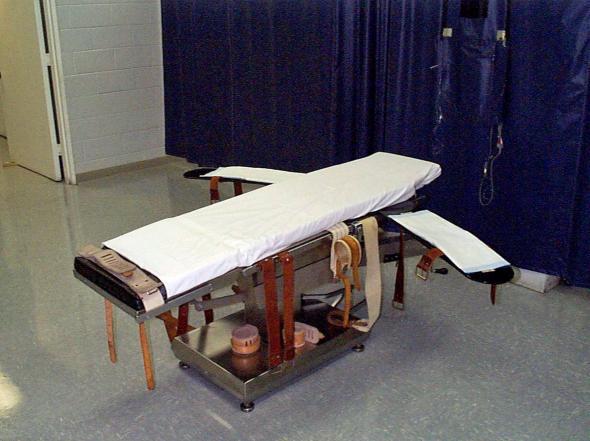Hours before the state of Arkansas was to start an unprecedented series of near-daily executions over the next 10 days, the state Supreme Court stepped in and blocked the first lethal injections—the state’s first in over a decade—from going forward Monday night. The 4-to-3 decision halts two executions scheduled for Monday night and puts in doubt the state’s plan to execute eight men before the end of the month when its supply of a lethal injection drug expires.
The state court’s ruling comes on the heels of a federal court intervening over concerns about one of the drugs—the sedative midazolam—used in the procedure. A federal appeals court, however, vacated that decision on Monday removing one barrier to the state carrying out the lethal injections. Despite the ruling, “[a] spokesman for the Arkansas Department of Correction said [-] the state was proceeding with the expectation that the execution would take place Monday night if the legal disputes were resolved,” according to the New York Times.
From the Times:
The argument that prompted Monday’s stay focused on a matter entirely different from the constitutional questions that have swirled around the state’s execution procedures and an injection drug, midazolam. Critics of the drug have argued that midazolam, a sedative, fails to render a prisoner sufficiently insensate to the pain of other medicines in lethal injections. Instead, the Arkansas justices considered whether Mr. Davis should be put to death while the United States Supreme Court hears a case about whether poor defendants with mental health problems are entitled to expert witnesses to assist them in preparing and presenting their cases. Although the Supreme Court has never directly addressed whether such experts must be independent of prosecutors, the justices had long planned to hear arguments on that question next week in a case involving a prisoner from Alabama, James E. McWilliams Jr. The possibility of a ruling that would affect Mr. Davis’s case, the Arkansas justices concluded, was enough to warrant stopping his execution.
Arkansas Gov. Asa Hutchinson said the state will appeal to the U.S. Supreme Court as numerous legal appeals on all sides make their way through the courts.
